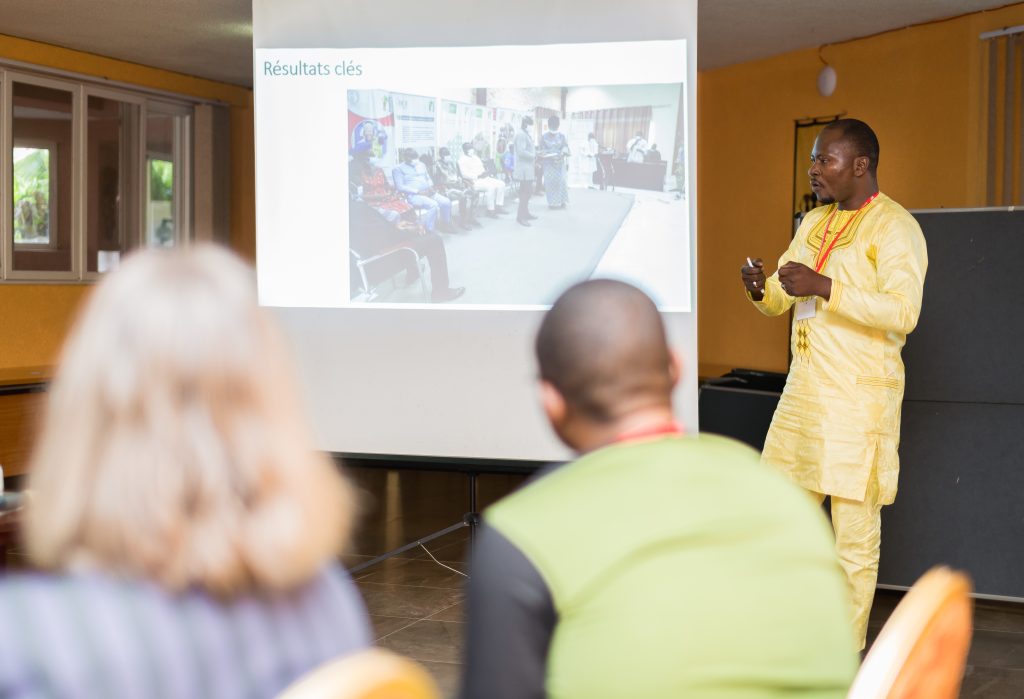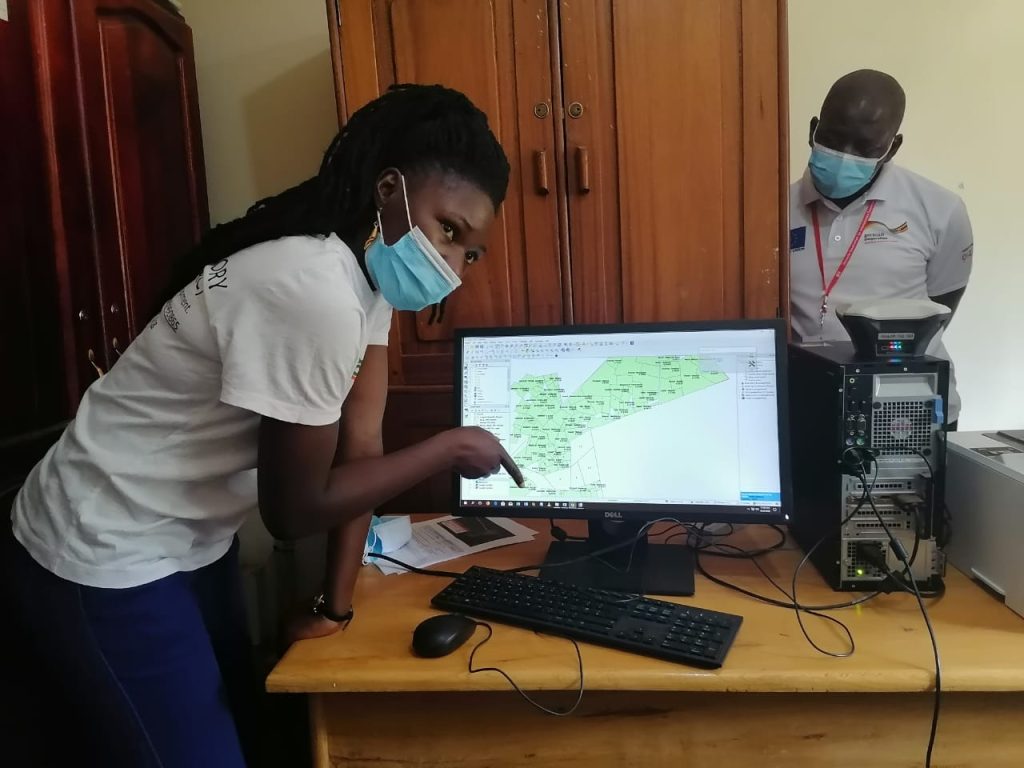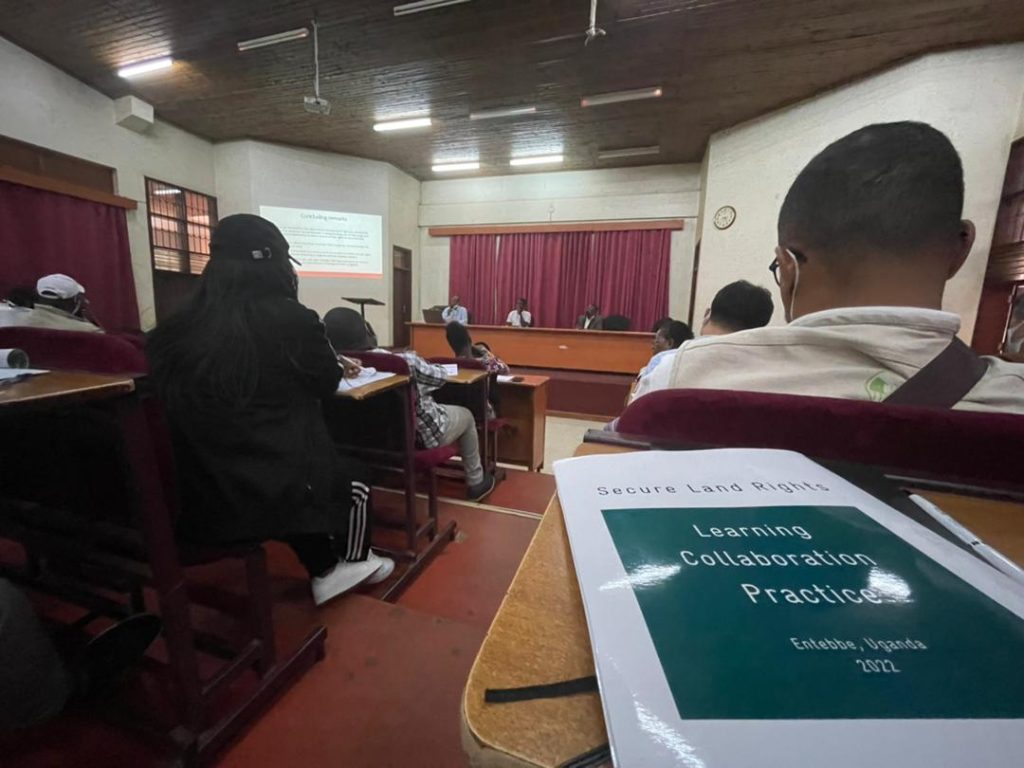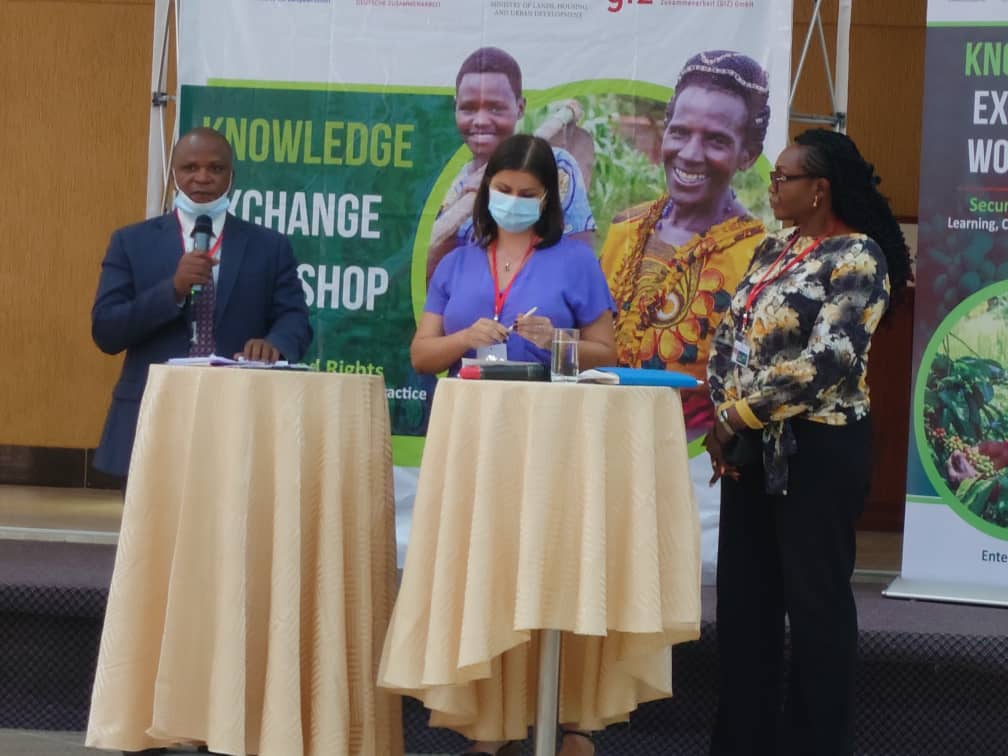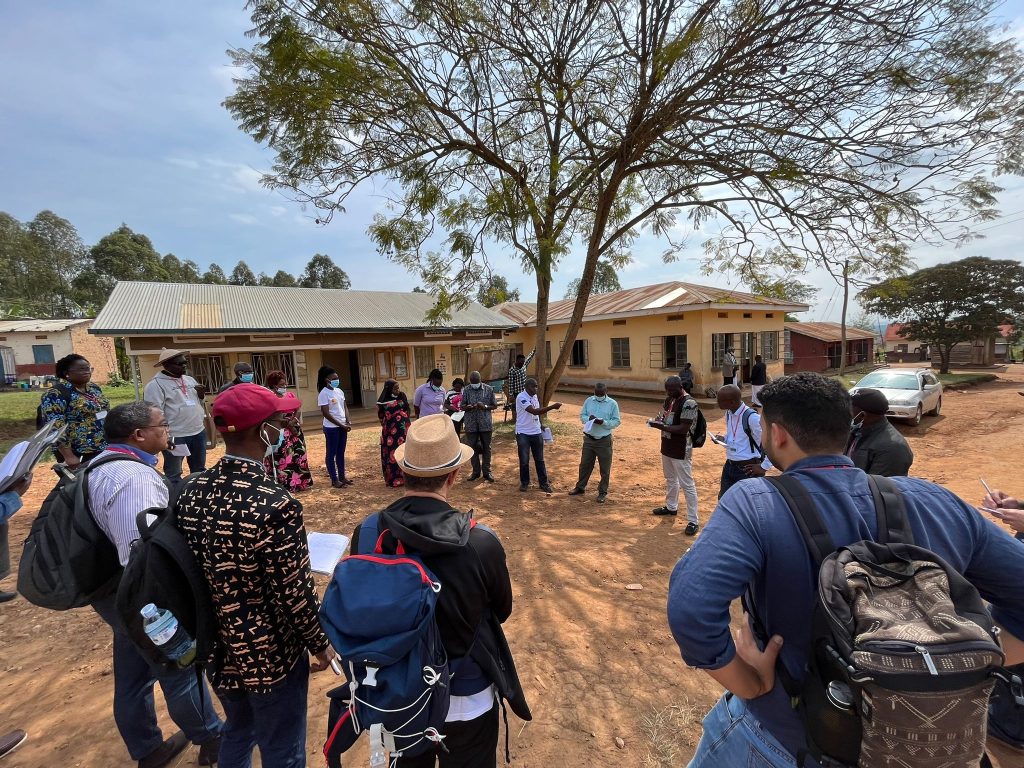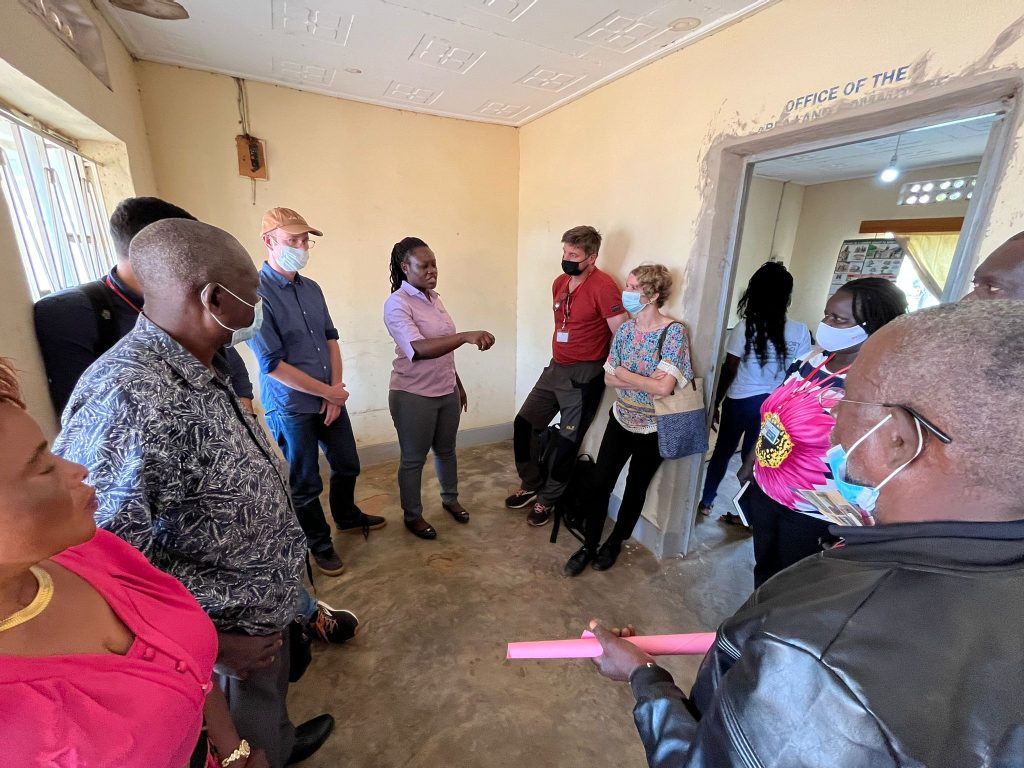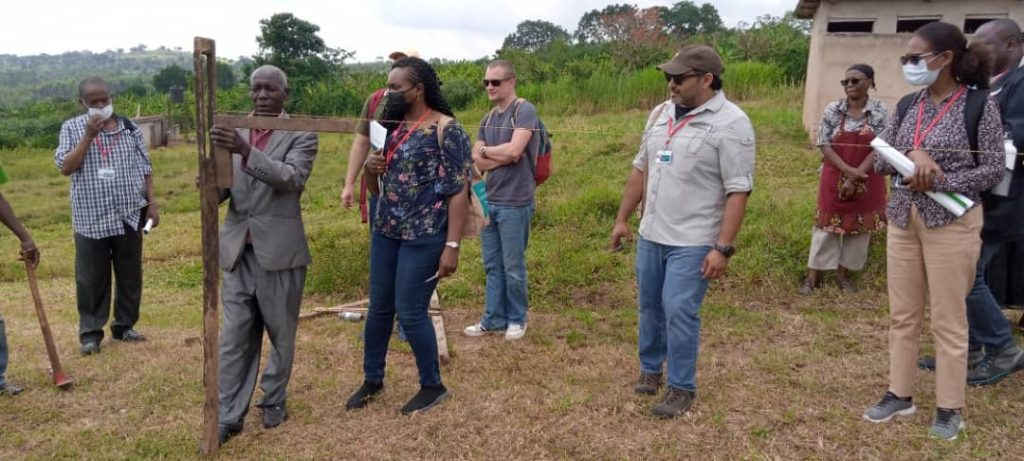Category: Uncategorized
Academics Push for National Research Agendas on Land Governance in Africa
The Knowledge Exchange Workshop (KEW) held on June 21, 2022, in Entebbe, was an opportunity for NELGA partners and land stakeholders to discuss and demonstrate the usefulness of research as a tool to support the formulation and implementation of land policies.
The session examined knowledge-to-policy-uptake in Senegal and Cameroon by outlining how such uptakes on land governance issues can be improved on a national and continental level. The session also featured case studies from Benin and Burkina Faso, elaborating an implementation model of the government policy on the sedentarisation of agro-pastoralist communities.
The discussions highlighted the importance of cooperation between research and parliamentarian bodies to explore linkages in formulating land-related policies and laws. The vision of this research is to inform legislation, but in Burkina Faso, there are difficulties in establishing contacts and spaces for discussion between academic institutions and the parliamentarian body.
The academic community in Benin is well organised and as such, the process for successful collaboration between research and policy/legitimacy Land Tenure Concerns Inventory has been developed. Academics in Benin are trying to improve the research aspect based on the needs expressed in the platform by CSOs and policy; by – among other things – condensing hundreds of pages of research into policy briefs, making it easier for the research to be available and used as a tool for communication with the policymakers. Seeing how pertinent research is in this context it is important to take stock of available knowledge and support its vulgarization and dissemination in the context of diagnostic studies. It is also important to strengthen multi-stakeholder platforms as a tool for elaborating on research agendas amongst stakeholders. One of the ways this can be accomplished is by strengthening NELGA as a platform of engagement and collaboration between policy and science across Africa.
This discussion highlights the relevance of research as a tool to support the implementation of land policies and reflects on approaches to establishing policy-science dialogue platforms at national levels. The session features case studies from Benin, Burkina Faso, Senegal and Cameroon examining knowledge-to-policy-uptake, from the continental to the national level. It outlines how such uptakes on land governance issues can be improved on a continental level and how this level interacts with the national level.
NELGA Holds Knowledge Exchange Workshop on Secure land rights – learning, collaboration, and practice
While significant global land tenure security achievements have been made over recent years, numerous challenges still remain. Advanced land management systems require a high standard of technical and administrative capacity, particularly as digital approaches are mainstreamed. Linking practical approaches and research in land management to policy often requires a combination of context-specific, holistic and cost-efficient solutions.
As a response to the above challenges, the German Federal Ministry of Economic Cooperation and Development (BMZ) commissioned GIZ in November 2015 to implement two global programmes on land governance, namely the “Global Programme on Responsible Land Policy†(GPRLP, hereafter called the Global Programme) and “Strengthening Advisory Capacities for Land Governance in Africa†(SLGA).
The Global Programme aims to improve access to land as a central precondition for poverty reduction and improving food security in rural areas, focusing on women and marginalised groups in selected countries. It currently implements activities in Benin, Ethiopia, Laos, Madagascar, Uganda, Burkina Faso, and Côte d’Ivoire, focusing on:
- improving procedures to secure land tenure rights of the rural population;
- strengthening civil society;
- cooperation with the private sector.
“Strengthening Advisory Capacities for Land Governance in Africa†(SLGA) focuses on strengthening institutional and human capacities for better land policies in African countries. The programme operates on a continental level through regional hubs and in the African Union member states. It collaborates closely with the African Land Policy Center (ALPC) and offers scholarships and exchanges via DAAD (German Academic Exchange Service).
Objectives of the Knowledge Exchange Workshop 2022
After 6.5 years of implementation in various countries, the two land governance programmes have supported a wide range of development options, adopted practical land rights formalisation approaches and incorporated them into policies. In addition, the creation of scientific networks has already proven to support the topic of land governance in training and research.
With several years of implementation still ahead, this is an ideal moment for the two global programmes to join hands, share successful experiences and lessons learnt, and define new ways forward in land tenure jointly with national partners in target countries. With a focus on South-South Exchanges, the programmes would like to make available increased knowledge and experiences across technical fora and networks. Thereby creating an opportunity to strengthen the topic of land tenure in a broader, more sustainable, and institutionalised manner.
In this Knowledge and Exchange Workshop, the organisers aims to:
- Reflect on responsible land policy development and implementation in partner countries based on scientific/expert input and policy advice;
- Share experiences, successes and challenges with a broader audience;
- Generate orientations for partner countries for future implementation and beyond;
- Strengthen the network of land experts and foster regional exchange; and
- Foster learning across countries and organisations for new land approaches.
The Knowledge Exchange Workshop will focus on four thematic areas, which are:
- Sustainable integration of fit-for-purpose (FFP) approaches into government procedures and policy for upscaling;
- Bridging gaps: demand-driven research for informed land tenure policy making;
- Fostering suitable frameworks for responsible land investments;
- From Reach to Benefit and Empower – Gender Transformative Approaches in Theory and Practice.
The content will include a range of sharing and discussions formats such as:
- Exchange of experiences to foster mutual learning and inspiration;
- Expert / scientific inputs on successful approaches;
- Presentations of good practices in target countries;
- Round tables/panel discussions, parallel sessions with results sharing;
- Multi-stakeholder exchange and policy dialogue;
- An excursion at the beginning of the KEW to appreciate the Ugandan experiences;
- Specific exchange format dedicated to participating Civil Society Organisations.
Les Meilleures Thèses et Mémoires sur le Foncier en Afrique Centrale Récompensées
En 2021, dans le cadre de la mise en Å“uvre des activités du projet “Renforcer les capacités de Conseil en Gouvernance foncière en Afrique”, le pôle d’Excellence NELGA a lancé un concours des meilleures thèses de Doctorat et mémoire de Master sur la question foncière en Afrique centrale. Il s’agissait pour toute personne ayant rédigé une thèse ou un mémoire récent sur la question, de la soumettre dans le cadre du concours. Pour les thèses, 13 candidatures dont celle d’une femme ont été reçues par le comité d’organisation contre 33 candidatures dont celle de 10 femmes pour les mémoires. Le comité scientifique ayant planché sur la sélection des meilleures candidatures était fort de 06 personnes. Sur la base de critères intégrant les aspects de genre, le Comité, dans le cadre de différentes séances de travail, a apprécié les différentes candidatures et rendu sa copie. Â
Pour la publication des résultats et la remise des prix aux meilleurs candidats et candidates, une cérémonie est prévue le 17 juin 2022 à l’AUF, 14 :00 à 16 :00 (UTC+1). Cette cérémonie en même temps qu’elle marque la première édition (2021 – 2022) de ce genre d’évènement permettra de célébrer l’excellence académique et scientifique en Afrique centrale sur les questions foncières.
Vous pouvez participer à la cérémonie en cliquant sur le lien ci-après: https://teams.microsoft.com/l/meetup-join/19%3ameeting_NmY5MGViMzItODNiZS00NDczLThiYmMtODc2MTI3NWQxODJh%40thread.v2/0?context=%7b%22Tid%22%3a%225bbab28c-def3-4604-8822-5e707da8dba8%22%2c%22Oid%22%3a%222b0af0bc-9114-49d2-ba12-e8bda0eaf348%22%7d
Martie’s Success Story – NELGA Alumni
Martie Mushaukwa is a 2017 NELGA-DAAD Scholarship Alum with the Namibia University of Science and Technology. In his words, he shares his story on how NELGA’s support helped achieve his career goals.
I was born in the northeast part of Namibia in the Zambezi Region, in a small settlement known as Lusese, where I grew up with my brothers and sisters, raised by my father and stepmother. As a child, I only wished to be a better person which was supported by my father and his push for his kids to get a better education and succeed through hard work. At a young age, all I knew was to pass my classes, courses or exams. I could not understand how others failed class tests or homework that is until I got to high school, where my activeness in social life became more meaningful.
After completing high school, I was not sure what I wanted to study. I ended up enrolling for a degree in education at the University of Namibia. Within a short period of time, I realized that the career path I was about to take was not what I had imagined. I decided not to enrol in any field of study and devoted the whole year to getting better career guidance. The following year I settled for a career in real estate. This led to my enrollment for a Diploma in Land Valuation and Estate Management at The Polytechnic of Namibia (now transformed into Namibia University of Science and Technology, NUST). In 2013, I decided to further my studies by pursuing a Bachelor of Property Studies (Honours) at the same university. Upon graduation, I decided to further my studies in my field and In 2017, I was awarded a DAAD Scholarship through the NELGA programme to further my studies toward a Master of Spatial Science at NUST.
My experience with DAAD and NELGA was great. It enhanced my professional career, in the sense that after I obtained my master’s degree, I became more attractive as a job candidate and more knowledgeable in my field of specialization. I am thankful to the DAAD and NELGA for the scholarship as it has made my education and career goals easier to achieve. With this scholarship, I became a better researcher and analyst in my field of specialization. These endear me to my contemporaries in my field of work.
Since graduating, I have been working for an agricultural bank, where I am at the forefront of developing, implementing, and guiding the real estate valuation function within the organization, thus providing an overall framework for valuation approaches and practice. Hence, I have become one of the key leading professionals in the field of Real Estate, engaging in real estate matters and contributing to vital decision making at a high level.
Martie’s Success Story – NELGA Alumni
Martie Mushaukwa is a 2017 NELGA-DAAD Scholarship Alum with the Namibia University of Science and Technology. In his words, he shares his story on how NELGA’s support helped achieve his career goals.
I was born in the northeast part of Namibia in the Zambezi Region, in a small settlement known as Lusese, where I grew up with my brothers and sisters, raised by my father and stepmother. As a child, I only wished to be a better person which was supported by my father and his push for his kids to get a better education and succeed through hard work. At a young age, all I knew was to pass my classes, courses or exams. I could not understand how others failed class tests or homework that is until I got to high school, where my activeness in social life became more meaningful.
After completing high school, I was not sure what I wanted to study. I ended up enrolling for a degree in education at the University of Namibia. Within a short period of time, I realized that the career path I was about to take was not what I had imagined. I decided not to enrol in any field of study and devoted the whole year to getting better career guidance. The following year I settled for a career in real estate. This led to my enrollment for a Diploma in Land Valuation and Estate Management at The Polytechnic of Namibia (now transformed into Namibia University of Science and Technology, NUST). In 2013, I decided to further my studies by pursuing a Bachelor of Property Studies (Honours) at the same university. Upon graduation, I decided to further my studies in my field and In 2017, I was awarded a DAAD Scholarship through the NELGA programme to further my studies toward a Master of Spatial Science at NUST.
My experience with DAAD and NELGA was great. It enhanced my professional career, in the sense that after I obtained my master’s degree, I became more attractive as a job candidate and more knowledgeable in my field of specialization. I am thankful to the DAAD and NELGA for the scholarship as it has made my education and career goals easier to achieve. With this scholarship, I became a better researcher and analyst in my field of specialization. These endear me to my contemporaries in my field of work.
Since graduating, I have been working for an agricultural bank, where I am at the forefront of developing, implementing, and guiding the real estate valuation function within the organization, thus providing an overall framework for valuation approaches and practice. Hence, I have become one of the key leading professionals in the field of Real Estate, engaging in real estate matters and contributing to vital decision making at a high level.
Twenty-Two Students are the First to be Enrolled in the new NELGA Land Governance Masters at UGB
The course aims to address land governance peculiarities in the region for social development
In 2021, twenty-two students from across Africa made history as the first set of people to be enrolled in the new Master’s Degree program on Land Governance and Territorial Management at Gaston Berger University of Saint-Louis (UGB ) in Senegal. The Master’s program introduced with the help of NELGA provides a platform to develop adequate human and technical capacities to support the development and implementation of land policies in Africa. The students are subject to an interactive and interdisciplinary pedagogy regime with continuous personal follow-up of the Masters’ leaders.
Prof Ibrahim Diallo, Coordinator of NELGA Francophone West Africa and Professor of Public Law at UGB expressed his delight at the new academic program welcomed by the
academic and professional world at the sub-regional and continental levels. The course considers the region’s peculiarities and the AU endorsed Guidelines for the Development of Curricula on Land Governance in Africa, “West Africa’s diversity in terms of language, colonial history, political regimes and stages of economic development has resulted in pluralistic land tenure regimes. The Master’s program attempts to address such land governance issues in West Africa and offers vocational education, articulating theoretical and practical training in land governance and land management,” articulates Prof. Diallo.
The academic program provides NELGA-DAAD scholarships to the enrolled student. It ends with a mandatory internship that concretizes the orientation of the master towards professional practice with practical experiences on topics such as land systems, land legislation, domains, spatial planning, land market, land information systems, territorial cooperation and planning, environment and climate change, impact studies, land conflicts and others. The program prepares students for the employment market post-graduation as the internship facilitates the positioning and placement of young people in the public or private sector. “This academic program is an asset to the region and the continent as it integrates a review of the past and possibilities for the future by investing in the young people of today with key knowledge useful for the economic and social development of the continent,” explains Prof. Diallo.
Land Stakeholders in Senegal Plan to Address Parliamentarians on Land Reforms
Land governance stakeholders in Dakar will meet policymakers to discuss reforms needed in the land sector based on current trends in the country. The meeting on May 12 to 14, 2022, is convened by the Network of Excellence on Land Governance in Africa (NELGA), a Francophone West Africa node that Gaston Berger University hosts. It is a follow-up meeting to a sensitization workshop held in October 2020 and calls for land reforms that promote local governance and territorial development.
The 2020 workshop initiated a dialogue between policymakers and academics on the challenges of land governance and the revival of land reform in Senegal, especially in promoting local governance and territorial development through the creation of the High Council of Territorial Communities and the recognition of new rights to citizens. These new rights coincided with the recent expansion of the powers of the National Assembly to monitor government action and evaluate public policies. At the end of the 2020 workshop, critical land governance issues that concern parliamentarians were identified, including policy and legal actions to address climate change, large-scale agricultural investments, and land conflicts. Similarly, commitments were made by the Network of Parliamentarians for the Environment in Senegal (REPES) to advocate in parliament to revive land reform processes. The meeting designed a roadmap in respect of the commitments made at the workshop.
This 2022 sensitization meeting aims to follow up on the road map and commitments made by the parliamentarians, especially in the face of the emerging issues faced by the land space since 2020. Such as the amendments to Decree 72-12 88, the Orientation Law on Sustainable Development of Territories (LOADT), and an increase in the development of land projects in Senegal as these laws and processes impact citizens’ rights to property, resources and freedoms. The 2-day workshop will feature participants from NELGA-UGB academics, REPES members, HCCT members, local elected officials, civil society, the private sector and parliamentarians. The meeting is expected to conclude with the design of a new road map to identify the next series of actions towards land governance in Senegal.
Find the concept note below.
Central Africa Land Rights Webinar on Land Expropriation Held
French-speaking African countries are carrying out major development projects such as hydroelectric schemes, various communication and energy structures and other structures for their citizens’ benefit. To carry out these projects, many states need land. This is done through various mechanisms, including expropriation where necessary. However, these lands come at a price as states are sometimes forced to evict families living in the coveted areas.
The Africa Land Policy Centre (ALPC), through NELGA, held a knowledge exchange Webinar on compensation mechanisms in Central Africa, especially Cameroon, on privately owned land taken by the government for the benefit of public use. The Webinar held on March 30, 2022, explored land expropriation and compensation mechanisms. The Webinar was hosted by NELGA Central Africa node with the support GIZ’s Strengthening Advisory Capacities for Land Governance in Africa (SLGA) program. It featured Prof Paul Tchawa, Commissioner Ministry of Environment and Nature Protection, Cameroon as its key speaker. Joan Kagwanja, Chief of ALPC, at the Webinar explained that the Central Africa region is a resource-rich investment area for Africa, especially in the regional integration of trade and investments. She emphasised the importance of exploring diverse large-scale land-based investment partnerships (LSLBI) before government expropriation, especially in line with the African Union principles and guidelines as endorsed by the AUC.
Prof Tchawa and the ensuing discussion called for participatory and applied solutions toward integrated development that leaves no one behind. They also called for stakeholders to learn from good practices as key to improving compensation processes, especially in humanising the process through resettlement plans while not compromising development objectives.
University of Yaoundé 1 Launch Review of its Curriculum on Land Tenure and Management
From April 12 – 15, under the chairmanship of Prof. Tchawa, Coordinator of the NELGA network on land governance for Central Africa, and with the financial support of NELGA through DAAD, the University of Yaounde 1 launched several review topics on land tenure for its existing Master’s program on Land Governance at the school. Content and courses reviewed include, cartography, information system and remote sensing applied to the sustainable management of territories.
Nearly 30 experts were gathered from across Cameroon. They discussed and shared their experience to update the curriculum of the Master programme which was originally established in 2009 and not reviewed since.
The review process applied the “Guidelines for the Development of Curricula on Land Governance in Africa” established by the African Land Policy Centre (ALPC). Through a preliminary analysis of the existing curriculum areas of improvement were identified, such as attention to the needs of marginalized groups, and preparing students to analyse conflicts related to land issues. The workshop produced a syllabus of the revised Master curriculum with descriptions of the modules, which will be used in the further progress to implement this updated curriculum.
Prof. Tchawa explained that it was timely and necessary to periodically review courses to ensure it aligns with current issues faced in the land space. He called on the participants to give their best in order to propose specialised content for the course on land management. The workshop documented the revised content for further review by management.
University of Yaoundé 1 Launch Review of its Curriculum on Land Tenure and Management
From April 12 – 15, under the chairmanship of Prof. Tchawa, Coordinator of the NELGA network on land governance for Central Africa, and with the financial support of NELGA through DAAD, the University of Yaounde 1 launched several review topics on land tenure for its existing Master’s program on Land Governance at the school. Content and courses reviewed include, cartography, information system and remote sensing applied to the sustainable management of territories.
Nearly 30 experts were gathered from across Cameroon. They discussed and shared their experience to update the curriculum of the Master programme which was originally established in 2009 and not reviewed since.
The review process applied the “Guidelines for the Development of Curricula on Land Governance in Africa†established by the African Land Policy Centre (ALPC). Through a preliminary analysis of the existing curriculum areas of improvement were identified, such as attention to the needs of marginalized groups, and preparing students to analyse conflicts related to land issues. The workshop produced a syllabus of the revised Master curriculum with descriptions of the modules, which will be used in the further progress to implement this updated curriculum.
Prof. Tchawa explained that it was timely and necessary to periodically review courses to ensure it aligns with current issues faced in the land space. He called on the participants to give their best in order to propose specialised content for the course on land management. The workshop documented the revised content for further review by management.
